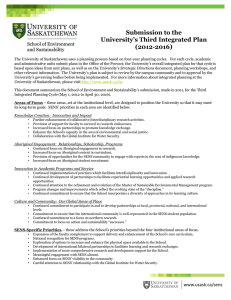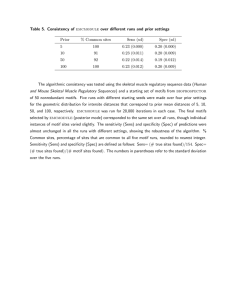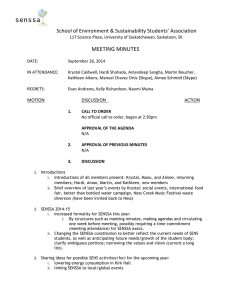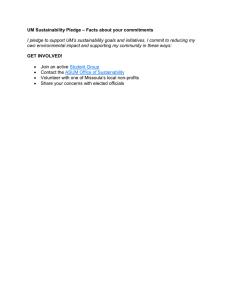TALKING E SENS
advertisement
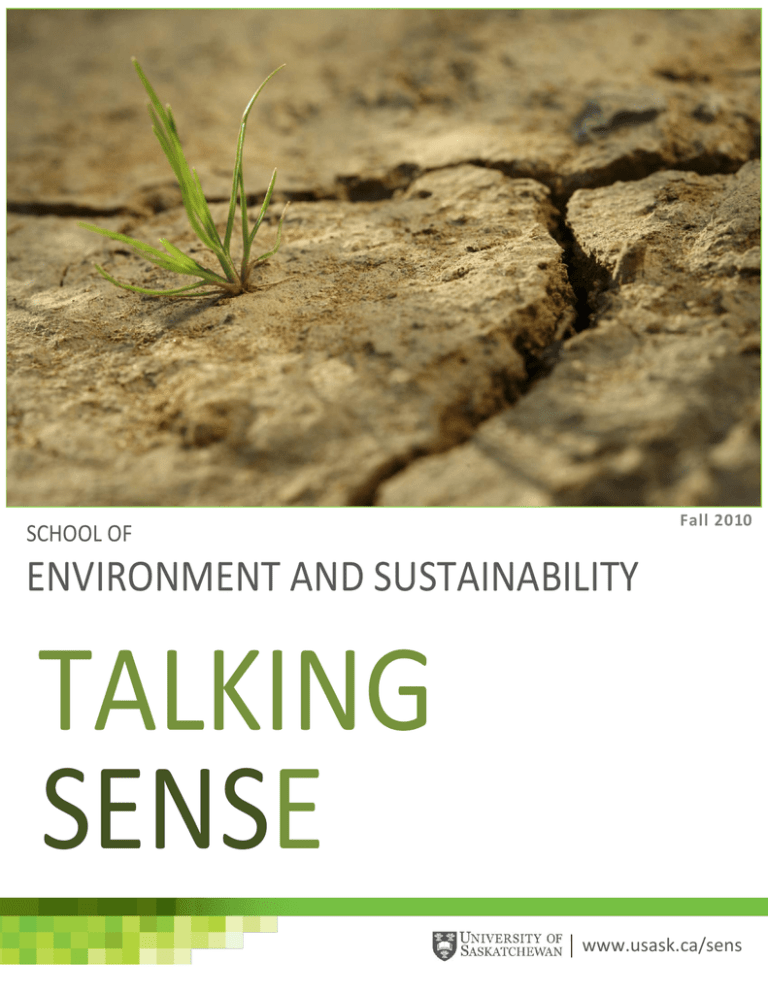
Fall 2010 SCHOOL OF ENVIRONMENT AND SUSTAINABILITY TALKING SENSE www.usask.ca/sens The School of Environment and Sustainability University of Saskatchewan Kirk Hall, Room 323 117 Science Place Saskatoon, SK S7N 5C8 Executive Director Karsten Liber Assistant Director - Academic Maureen Reed Copy-editing Erica Schindel, Communications and Marketing Specialist Sharla Daviduik, Administrative Officer Please submit your comments to sens.info@usask.ca Photo: Christine Markel, Dunn Horse Creek 2008. Christine was one of the first students to graduate from the MSEM program. Student photos will be featured in each issue of the newsletter. To have your photo featured, please email it to sens.info@usask.ca CONTENTS 2 3 Message from the executive director 4 Message from the SENS student association (SENSSA) 5 SENS profiles 7 SENS engages in new sustainability and learning partnership 8 Securing the future of the world’s water supply 9 Connecting with the community 9 Upcoming events School of Environment and Sustainability | University of Saskatchewan | Fall 2010 EXECUTIVE DIRECTOR’S MESSAGE DR. KARSTEN LIBER In late summer 2007, several University of Saskatchewan faculty from a diverse array of disciplines were invited to join the advisory committee for the newly-created School of Environment and Sustainability (SENS). I was fortunate enough to be one of those. The School had no faculty, no students, no staff, no programs, and no space - it was only a concept, albeit one recently approved by University Council. Given that only a little more than three years have passed since that time, the amount of growth which has occurred at SENS is nothing short of astonishing. Today, the School houses a thriving community of seventeen core faculty (still from a diverse array of disciplines – a hallmark of SENS), twenty-two associate faculty, and eleven adjunct faculty; numbers continue to grow. As one of the three interdisciplinary graduate schools on campus, SENS has contributed to significant gains in graduate student enrolment. The School has grown from 10 students in 2008/09 to 65 students in 2010/11, an increase of over 600% in three short years. At present, SENS is home to twenty-eight students in the Master of Sustainable Environmental Management (MSEM) program, fifteen students in the Master of Environment and Sustainability (MES) program and fourteen students in the Doctor of Philosophy in Environment and Sustainability (PhD) program. Four staff, with appointments ranging from 1/3 FTE to full-time, are employed at SENS. The School rd moved to the north wing of the 3 floor of Kirk Hall in January 2010, and acquired a further six offices in the rd west wing of the 3 floor very recently. The most significant milestone, however, was achieved on October 23, 2010, when nine students became the first graduates of the School of Environment and Sustainability. Two Master of Environment and Sustainability and seven Master of Sustainable Environmental Management degrees were awarded at the University of Saskatchewan’s Fall Convocation ceremony. These nine – Poornima Sheelanere, Garrett Richards, Mindy Neufeldt, Emily Heffring, Christine Markel, Michel Lavallée, Matthew Hiltz, Gelman Cortes, and Nicholas Trevisan – now become our first alumni. We hope that they and future SENS alumni will continue to feel connected to the SENS community, and we hope to use this newsletter as one way of maintaining that connection. Given the amount of tasks to be completed and the number of meetings to attend in the day-to-day administration of the School, one does not often have the opportunity to reflect upon how much SENS has grown in a very short period of time. The work of the SENS Advisory Committee in 2007-2008 provided a solid foundation for the future activities of the School, one built upon collaboration and respect for diversity. These are some of the core values which continue to define SENS. This newsletter will speak to the collaborative work continuing at SENS today. It will tell stories about our students and our faculty, and now, our alumni. It will provide a means of keeping the SENS community connected. Sincerely, Karsten Liber, PhD Executive Director Left to right: Emily Heffring, Mindy Neufeldt, and Poornima Sheelanere, at Convocation, Fall 2010 School of Environment and Sustainability | University of Saskatchewan | Fall 2010 3 MESSAGE FROM THE SENS STUDENTS’ ASSOCIATION (SENSSA) Back row (left to right): Rezaur Rahman, Sarah Turkeli, Skye Ketilson, Shannon Dyck, Ranjan Datta, and Charu Gupta. Front row (left to right): Colleen George, Graham Barber, and Jesse Woodward. Missing: John Kearns and Amanda Burke The School of Environment and Sustainability Students’ Association (SENSSA) exists to represent, serve and support the academic and nonacademic needs of graduate students within SENS. It also aims to offer its members opportunities to be involved in academic, social and political activities on campus and within broader communities. We are lucky to have such a dedicated group of students this year; every executive position has been filled and our students have shown tremendous interest in being involved on campus and in the broader community. With so many of our students expressing the importance of meeting others and getting involved, members of SENSSA helped organize the SENS Connect event (see page 9) in September in collaboration with SENS, have been posting events that may be of interest to our students on the SENSSA website, and have just recently created a list of organizations and potential employers in the environmental sector that our students may wish to contact for research, volunteer, or employment opportunities. Hopefully we can do more in these areas of involvement and networking so that our students are able to discover the many opportunities available to them, as well as experience what our university and city have to offer. of new and continuing students. For this reason, SENSSA will continue to play a role in supporting students who wish to organize events, participate in campaigns, or get involved in other ways. For example: Arranging social and networking events for our students has and continues to be an important part of SENSSA; The Better than Bottled campaign that was established last year is still working towards sustainable drinking water use on campus; Some of our students have expressed an interested in partnering with students from Aden Bowman Collegiate on environmental projects; One of our executive members has starting looking into the possibility of obtaining affordable bus passes for SENS students and other graduate students; SENS students have expressed the desire to learn within a culturally diverse setting. As such, the potential increase in tuition for international students has arisen as an issue to consider due to the number of international students SENS has attracted and continues to attract; and, The executive is currently developing a constitution for its members. SENSSA hopes to remain flexible in order to meet the needs and interests 4 School of Environment and Sustainability | University of Saskatchewan | Fall 2010 Although this list isn’t exhaustive, it is meant to outline an array of activities that SENS students have been interested in engaging in and to show that there is potential for SENSSA to develop or support many types of initiatives. We look forward to working with all of you this year. Please do not hesitate to contact us if you have questions, ideas, or feedback. Sincerely, The SENSSA Executive Shannon Dyck, president Ranjan Datta, vice-president Skye Ketilson, secretary Charu Gupta, treasurer Graham Barber & Rezaur Rahman, social coordinators Sarah Turkeli, campus liaison coordinator Amanda Burke & Jesse Woodward, community liaisons Colleen George, academic affairs coordinator John Kearns, webmaster SENS PROFILES: FACULTY DR. CHRISTY MORRISSEY Christy is the newest faculty member in the School of Environment and Sustainability SENS affiliation: Assistant Professor, joint appointment in the Department of Biology and SENS Place of birth: Vancouver, British Columbia Most significant achievement: I have completed several postdoctoral fellowships both in Canada and the UK funded by NSERC, The Royal Society and the Leverhulme Trust. One of my most significant research achievements involved a project investigating the interactions between the Mountain Pine beetle epidemic in B.C. and native forest birds. Through a combination of field and laboratory studies, we revealed risks to woodpeckers from applications of an arsenic based pesticide, monosodium methanearsonate, used to control beetle outbreaks. Evidence pointed to an increased risk of exposure and toxicity to avian predators, but also to indirect effects from reduced food supply. The published results were used by several government agencies both in Canada and the United States within environment, human health and forestry sectors in order to develop regulatory decisions regarding future use of this chemical. The research team, including myself and my colleagues, were awarded an Environment Canada “Citation of Excellence” for our collective contribution which led to deregulation of the chemical and our role in mitigating the impacts to insectivorous cavity nesting birds and future human exposure. Favourite book: A Thousand Splendid Suns By: Khaled Hosseini Influences: Theo Colborn and Rachel Carson (for their insight and contributions in communicating how contaminants are affecting the environment), John Elliott (my mentor for the past 13 years) and Karen Kidd (a scientist that I admire) What impact do you hope that your research will have? I hope my research will inspire students to engage in science in a quest for learning, but also to respect wildlife not only for their intrinsic value but also for their ability to tell us what we are doing to the earth. How do you define sustainability? I define sustainability as a type of "borrowing"- we need to borrow natural resources with the aim of giving something back. School of Environment and Sustainability | University of Saskatchewan | Fall 2010 5 SENS PROFILES: STUDENTS ARCADIO VIVEROS GUZMAN Arcadio was recently awarded a scholarship by the Public Health and the Agricultural Rural Ecosystem Graduate Training Program (PHARE). SENS affiliation: PhD Candidate Place of birth: Veracruz, Mexico Most significant achievement: Academically speaking: the completion of a Master's Program in Canada. At a personal level, a higher sense of happiness. Favourite book: The Diary of Anne Frank Influences: My parents’ values, my professors, and a number of books. What impact do you hope that your research will have? I expect that my research will help to improve the operation of the Canada-Mexico Seasonal Agricultural Workers Program in Saskatchewan in terms of the socio-environmental aspects of worker agricultural health and safety information and training, as well as their roles with respect to sustainable agriculture. My research will provide crucial information for policymakers and for other stakeholders directly involved with coordinating this program and other related off-shore agricultural workers programs. How do you define sustainability? In my opinion, sustainability is a collective term to describe several aspects and processes about the way we live. Sustainability is a term that should describe not only sociocultural, environmental and economic aspects, but also should capture the understanding of the human aspects of development, cross-cultural awareness, well-being, governance, and political will, as well as public participation. In my opinion, sustainability should capture the idea that the sustainability process begins at a personal level by developing and practicing a higher sense of awareness and collective responsibility. I also think that the first place where the process of sustainability starts is at home. SENS PROFILES: ALUMNI POORNIMA SHEELANERE SENS affiliation: MES Alumna Place of birth: Hassan, India Poornima was the first SENS student to complete a Master of Environment and Sustainability degree Most significant achievement: Training of over 1,000 school teachers and students on environmental conservation and sustainability practices in India Favourite book: The God of Small Things By: Arundhati Roy Influences: My parents and my husband, and the scores of teachers and students with whom I have interacted 6 School of Environment and Sustainability | University of Saskatchewan | Fall 2010 What impact do you hope that your research will have? My research will certainly benefit policy makers and administrators in building an integrated institutional framework for assessing and managing cumulative effects in a watershed. How do you define sustainability? Sustainability, to me, is the practice of the judicious use of resources today, tomorrow, and in the future by every one of us. SENS ENGAGES IN NEW SUSTAINABILITY AND LEARNING PARTNERSHIP SENS Executive Director Karsten Liber brainstorming potential project ideas with community members and students from Aden Bowman Collegiate On October 10, 2010, the School of Environment and Sustainability (SENS), the Saskatoon Public School Board and Aden Bowman Collegiate announced a new partnership to provide greater opportunities for high school students and U of S graduate students to engage in interdisciplinary learning and communitybased projects focused on sustainability. In addition to participants from the three signing partners, many community organizations and media outlets were present at the announcement. The agreement encourages collaboration in areas such as sustainable living, active citizenship, community involvement and lifelong learning. “This partnership creates valuable opportunities for SENS to connect with high school students and engage them in dialogue and research related to the complex connections between community and environment,” said Karsten Liber, Executive Director. “These activities will allow us to develop champions of environmental SENSSA President Shannon Dyck engaging with youth at Aden Bowman Collegiate sustainability by exchanging ideas and encouraging informed discussions between graduate students and high school students, high school students and their families, and family members and their communities. This partnership is one of many ways that the SENS can connect with the broader community.” On the afternoon of the public announcement at Aden Bowman Collegiate, participants were divided into groups and were asked to brainstorm various ways in which the partnership could be put into action. Suggested activities included: Conducting educational workshops, seminars and field experiences, with each other and for the public Exploring community gardening Raising water awareness/action Considering sustainability in relation to Aboriginal peoples and new immigrant communities Focusing on urban planning Discussions have now started regarding next steps among the agreement partners, as well as with community groups. A first shared initiative will involve SENS co-hosting a sustainability conference at the U of S with Aden Bowman students and staff in early December. The conference will bring together over 100 individuals focused on helping youth and the two schools to advance sustainability action plans. A second initiative is being coordinated for the winter months, with SENS and Aden Bowman students participating in a City of Saskatoon multi-stage consultation process on the re-design of Kinsmen Park. Through experiential involvement in the stages of an urban design process, and with opportunities to help facilitate it, students will gain insight into urban planning, public engagement and active citizenship. A third initiative which is being explored for the spring is the development of a joint community garden project connected to enabling greater healthy food access in downtown Saskatoon. Discussions are underway with We Are Many and other community environmental groups on possible directions that a food garden initiative might take. “By focusing on youth and community engagement as one of the early outreach efforts of SENS, we are emphasizing the important role that youth can play in moving environmental sustainability forward both locally and globally,” said Dr. Marcia McKenzie, Chair of SENS’ Outreach and Engagement Committee. “By engaging SENS students in joint projects with youth in the city who are also passionate about and taking action on sustainability, we hope that both groups and the communities they affect will benefit.” These initiatives are also an opportunity for SENS to develop relationships with the City of Saskatoon and various community partners, and to show SENS’ interest in collaborating further on local sustainability initiatives. School of Environment and Sustainability | University of Saskatchewan | Fall 2010 7 SECURING THE FUTURE OF THE WORLD’S WATER SUPPLY Left to right: SENS Executive Director Karsten Liber, President Peter MacKinnon, VP Research Karen Chad and CERC Howard Wheater On May 17, 2010, the U of S was awarded $10 million over seven years from the federal government and a matching $10 million from the Government of Saskatchewan to establish a prestigious Canada Excellence Research Chair (CERC) in Water Security and a world-leading research and training institute focused on solving critical challenges for domestic and global water security. The partnership investment also includes a $10-million commitment from the U of S, to be met with the help of its friends and supporters, as well as in-kind contributions from both Environment Canada and the Saskatchewan Research Council. The U of S is one of only 13 universities in the country to be awarded a CERC, through a highly competitive selection process that aims to attract world experts to Canada. The CERC at the University of Saskatchewan is held by Dr. Howard Wheater, a renowned international expert on water management issues. Dr. Wheater also holds the rank of professor in the School of Environment and Sustainability. Led by Wheater, the new Global Water Institute will address a wide variety of industrial, environmental and social issues, with an aim of changing water management policies and procedures around the world. 8 Drawing upon leading expertise from across the university in water-related sciences, engineering, health and social sciences, the institute will educate and empower people, broadly influencing rapid change in the use and management of water. “By bringing together ecology, toxicology and hydrology, we will develop a new science and the risk assessment tools needed to understand and manage the complex interactions between water, land use and climate change,” said Wheater. “Through our new global water institute, we will train the next generation of water scientists to better ensure a secure future for the world’s water supplies.” The institute will: • Explore the interconnections of water, land and climate to improve water use and management; • Translate knowledge; • Advance water policies; • Educate students and professionals on water usage, management and reclamation efforts; and, • Provide new tools for assessing the impact on water quality and quantity. School of Environment and Sustainability | University of Saskatchewan | Fall 2010 A total of 85 new positions will be created at the institute, including six faculty, 20 post-doctoral fellows, 24 PhD students, 24 master’s students, and 10 support staff. For more information about Dr. Wheater and the Global Water Institute, visit www.usask.ca/water CONNECTING WITH THE COMMUNITY SENS students engaging with industry partners at SENS Connect On September 16, 2010, the School of Environment and Sustainability, in partnership with its graduate student association, welcomed various organizations from Saskatchewan’s environmental sector to campus to network with up-and-coming environmental professionals and researchers from the school. SENS Connect also provided students who are new to Saskatoon with information about the environmental community in the city and the surrounding region. Organizations that attended SENS Connect included: Agriculture and Agri-Food Canada Agriculture in the Classroom Sask Ducks Unlimited ECO Canada - SK Chapter Environment Canada Prince Albert Model Forest RCE Saskatchewan Redberry Lake Biosphere Reserve Saskatchewan Eco Network Saskatchewan Environmental Industry and Managers’ Association Saskatchewan Outdoor and Environmental Education Association Saskatchewan Research Council University of Saskatchewan Office of Sustainability We Are Many SENS would like to thank the above organizations for participating in the event, and looks forward to continued engagement with the broader environmental community in Saskatoon and beyond. UPCOMING EVENTS AND ENVIRONMENT DAYS SENS Events November 16 – Master of Environment and Sustainability Defence. Candidate: Åsa Almstedt. Thesis title: Adaptive Governance for Fire Management Planning – A Case Study on Prince Albert National Park, Saskatchewan. 10 a.m., Van Vliet Library (Agriculture 3D36) November 16-17 – College of Graduate Studies and Research Information Fair - 10 a.m. to 4 p.m., Physical Activity Centre December 6 – ENVS 803 Research in Environment and Sustainability Poster Day, Education Students' Lounge (EDUC 1005), 10 a.m. - 2 p.m. March 18, 2011 – Master of Sustainable Environmental Management ENVS 992 Project in Environment and Sustainability Proposal Symposium. Time and location to be announced. Environment Days March 22 – World Water Day Late March – Earth Hour April 22 – Earth Day Early May – Drinking Water Week June 5 – World Environment Day October 17 – International Day for Eradication of Poverty School of Environment and Sustainability | University of Saskatchewan | Fall 2010 9
